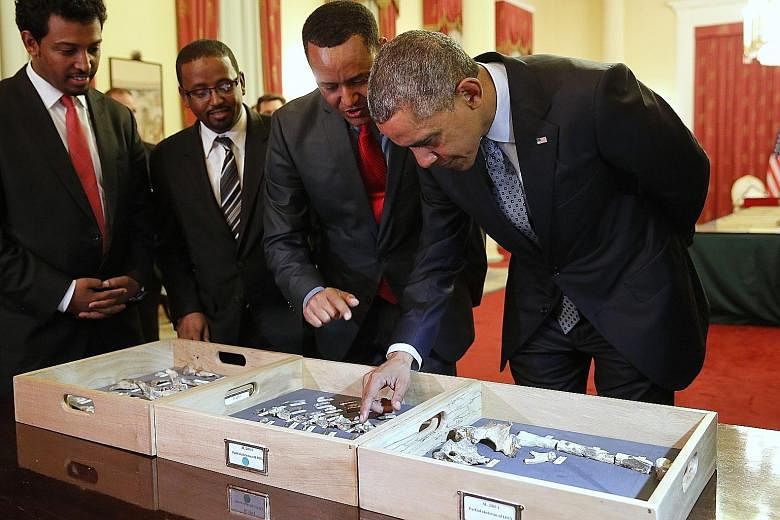ADDIS ABABA (Ethopia) • US President Barack Obama yesterday closed a five-day visit to Africa by delivering a stern warning that even as the region has shown increasing economic dynamism, its political leaders are falling dangerously short of meeting the challenges that threaten their societies.
Mr Obama, who has African ancestry, began his address to representatives of the continent's governments assembled at the African Union headquarters in Addis Ababa by saying that he came before them not only as the first US president to appear at the organisation but also "as the son of an African".
He also had a warning: The continent's economic progress rests on "a fragile foundation" and its governments are not fully prepared for "the enormous undertaking" of providing opportunities for a demographic bulge of young people who will need to find work.
"We need only look to the Middle East and North Africa to see that large numbers of young people with no jobs and stifled voices can fuel instability and disorder," Mr Obama said.
The continent's population will double to two billion people in the decades to come, many of them under the age of 18.
Essential to making that progress, Mr Obama added, is excising the "cancer of corruption" that is holding back international investment and local growth.
"A half century into this independence era, it is long past time to put aside old stereotypes of an Africa forever mired in poverty and conflict," he said, adding that the United States is changing its approach to Africa from aid to development, with schemes to help its nations attract private investment and nurture homegrown businesses.
Taking an indirect jab at China, which has been spending on infrastructure projects in many parts of Africa, Mr Obama said "economic relationships cannot simply be about other countries building infrastructure with foreign labour or extracting Africa's natural resources".
"Real economic partnerships have to be a good deal for Africa. They have to create jobs and capacity for Africans. That's the kind of partnership America offers," he said.
Highlighting threats ranging from Al Shabaab in Somalia, Boko Haram in Nigeria, insurgents in Mali and Tunisia, and the Uganda-led Lord's Resistance Army rebels in central Africa, he stressed that the US also stood with Africa to defeat terrorism and end conflict.
Mr Obama drew cheers and applause from his audience when he decried African leaders who cling to power. He referred to Burundi's leader Pierre Nkurunziza, who was recently elected to a third term even though the country's Constitution limits the president to two.
"When a leader tries to change the rules in the middle of the game just to stay in office, it risks instability and strife, as we've seen in Burundi," Mr Obama said.
His pointed joke about those who try to stay a "president for life", encapsulated his criticism of graft and governance in Africa. "I don't understand why they want to stay so long, especially when they have a lot of money," he quipped.
Mr Steven Gruzd, an analyst at the South African Institute of International Affairs in Johannesburg, said Mr Obama's tough language was not unexpected, though by itself will not trigger significant changes among Africa's leaders.
"Some will welcome the fact that the US President has raised some thorny issues and some will say it is none of his business and we are not an American colony," he said.
BLOOMBERG, AGENCE FRANCE-PRESSE

